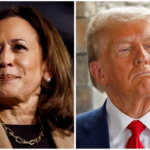Unlock the Editor’s Digest for free
Algeria’s Presidential Election Results Spark Controversy
In a surprising turn of events, the three candidates in Algeria’s recent presidential election have come forward with complaints of irregularities in the ballot and raised doubts about the official results. The incumbent, Abdelmadjid Tebboune, was declared the winner in a landslide victory, but his opponents have raised concerns about the accuracy of the figures announced by the National Independent Election Authority (ANIE).
The joint statement issued by the managers of the three election campaigns highlighted the “vague and contradictory” numbers released by ANIE, which they claim do not align with the counts declared at the local level by election officials. Tebboune secured a staggering 94.7 per cent of the vote, with Abdelali Hassani Cherif and Youcef Aouchiche trailing behind with 3 per cent and 2.1 per cent, respectively.
The low voter turnout of 5.6 million out of Algeria’s 24 million registered voters has raised eyebrows, especially after ANIE initially reported a turnout rate of 48 per cent following the close of voting. This discrepancy has cast a shadow of doubt over the legitimacy of Tebboune’s victory and his mandate to govern.
Analysts suggest that Tebboune’s need for a strong popular mandate may have contributed to the alleged irregularities in the election process. The president had promised to implement economic reforms, including salary and pension increases, in a bid to boost voter participation after the abysmally low turnout of 40 per cent in the 2019 election.
The joint complaint from the opposition candidates has sparked speculation about potential discord between Tebboune and the military leaders who wield significant influence in Algerian politics. As a key player in the OPEC oil exporters group and a major gas supplier to Europe, Algeria’s political stability is crucial for regional stability.
Tebboune’s presidency has been marred by controversy since his election in 2019, which followed months of mass protests known as the Hirak movement. Despite promising to address the protesters’ demands for political reform, Tebboune has faced criticism for cracking down on dissent and curtailing civil liberties.
As the opposition vows to contest the election results in the country’s constitutional court, the future of Algeria’s political landscape remains uncertain. The outcome of this dispute could have far-reaching implications for the country’s democratic trajectory and the balance of power between civilian leaders and the military establishment.






